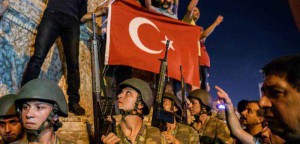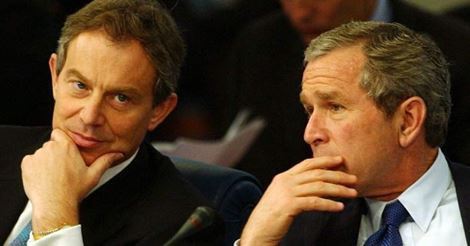A couple of days ago marked the one-year anniversary of the failed coup attempt in Turkey.
This event has been substantially commemorated in Turkey in recent days; although, even now, it really isn’t clear precisely what happened a year ago.
Some still think the ‘coup’ attempt was staged by the government as a means for Erdogan to consolidate power and begin purges across national institutions. Others still think it was a failed CIA-backed plot, involving ‘Gulenist’ agents, and aimed at overthrowing Erdogan and his party.
I covered the matter here a year ago; and I still tend to wonder if what actually happened might’ve been a mixture of both explanations (specifically, that it might’ve been a Gulenist-led plot, but that Erdogan’s people had gotten wind of it and decided to use it to their advantage) – which would explain why the story was so confusing.
However, I also still think it is possible that it was simply a botched attempt by a small group of military people to remove a government that was moving too far away from Turkish secular democracy (this had been my initial instinct, which I later amended): particularly as there has previously been a tradition of the military intervening in Turkish politics.
Where things have gone since then is well attested to: Erdogan has continued to consolidate power, while purges have been carried out across Turkish institutions, resulting in thousands of arrests, calls for the restoration of the death penalty, and – most recently – a narrowly-won (and, according to some, very dubious) referendum to alter the constitution.
Erdogan’s purge, not just of the military, but of the judiciary and police force doesn’t do much to dispel accusations that he may have organised the failed coup himself in order to provide the premise for his subsequent actions. With all of that going on, it is very easy to go with the ‘Erdogan the Would-Be Dictator’ or ‘Sultan’ motif and to portray the entire situation in terms of one man’s quest for power.
As previously highlighted, however, this depiction of things – as tempting as it is to stick with – makes the mistake of overlooking too much else.
For clarity’s sake, this isn’t really a ‘defense’ of Erdogan; more an attempt to redress the balance a little. ‘Defending’ Erdogan is, frankly, too difficult; especially when he comes out with statements about ‘ripping the heads off these traitors’ and ‘we will cut their heads off’ (as he did in front of the mass gathering of loyal supporters a couple of days ago).
But the problem with newspaper headlines like ‘Who Will Stop Erdogan?’ (as appeared in France in recent days – see picture at the top of the page) is that it is an over-simplification of the dynamics of what is going on in Turkey.
Near as I can tell, what’s going on in Turkey isn’t just a straight case of a power-hungry dictator (or ‘Sultan’) trying to acquire absolute power and control. That is going on, no doubt – but it is part of a more complicated ‘civil war’ type conflict between two powerful networks vying for control of Turkey: and in which there is good reason to suspect that the other side of that conflict is potentially more dangerous – or at least more insidious.
The exiled ‘opposition’ figurehead Fethulleh Gulen – accused by Erdogan of being behind the coup – has been linked to the Turkish Deep State, the CIA and NATO intelligence by several sources.
Former FBI translator, Turkish-born Sibel Edmonds, was adamant that the attempted coup was orchestrated by the US Deep State. Edmonds describes Fethulleh Gülen as an “extremist” and “terrorist”, currently under criminal investigation by the FBI for money laundering, among other things.
Edmonds describes his allegedly ‘moderate’ schools as “madrasas” that are spawning extremism worldwide and she describes Gülen as wanting to see Sharia Law implemented in Turkey; this is in total contrast to other claims that the Gülenist Movement is ‘moderate’ compared to Erdogan’s Islamism and that Gulen is the more ‘secular’ voice. But Edmonds cites Gulen as head of a fundamentalist Islamic movement in Turkey (with the support of the Clinton Foundation).
This view of Gulen and his movement is shared by others, including very well placed sources. I covered much of this a year ago; but some of it is worth revisiting as the divisive situation in Turkey continues to polarise.
The problem with this version of events, as previously argued, is that, at best, there may be little ideological difference between a lot of Gulen’s and Erdogan’s respective core support – both being generally Islamist in nature; which makes the conflict between them all the more difficult to understand. It may be because the conflict is less to do with ideology and more to do with conflicting ambitions.
But the portrayal of Fethulleh Gulen as a more ‘moderate’ opposition to Erdogan appears to be deliberate camouflage for something very different.
In a 2009 study of Gulen, Rachel Sharon-Krespin (director of the Turkish Media Project at the Middle East Media Research Institute), writes, ‘Fethullah Gülen is an imam who considers himself a prophet. An enigmatic figure, many in the West applaud him as a reformist and advocate for tolerance, a catalyst of “moderate Islam” for Turkey and beyond. He is praised in the West, especially in the United States, as an intellectual, scholar, and educator…’

But later she expands this assessment of Gulen beyond the veneer (and in so doing may help give some justification for why Erdogan would now be moving to purge academia, universities, as well as police and other institutions);
She wrote, ‘The core of Gülen’s network is his educational institutions. His school network is impressive. Nurettin Veren, Gülen’s right-hand man for thirty-five years, estimated that some 75 percent of Turkey’s two million preparatory school students are enrolled in Gülen institutions. He controls thousands of top-tier secondary schools, colleges, and student dormitories throughout Turkey, as well as private universities, the largest being Fatih University in Istanbul. Outside Turkey, his movement runs hundreds of secondary schools and dozens of universities in 110 countries worldwide. Gülen’s aim is not altruistic: His followers target youth in the eighth through twelfth grades, mentor and indoctrinate them in the isikevi, educate them in the Fethullah schools, and prepare them for future careers in legal, political, and educational professions in order to create the ruling classes of the future Islamist, Turkish state. Taking their orders from Fethullah Gülen, wealthy followers continue to open schools and isikevi in what Sabah columnist Emre Aköz called “the education jihad.”..’
Concerning purpose and motive, she continues, ‘Bayram Balci, a French scholar of Turkish origin, wrote, “Fethullah’s aim is the Islamization of Turkish nationality and the Turcification of Islam in foreign countries. Dozens of Fethullah’s ‘Turkish schools’ abroad—most of which are for boys—are used to covertly ‘convert,’ not so much ‘in school,’ but through direct proselytism ‘outside school.’” Balci explained, “He wants to revive the link between state, religion, and society.”… Fethullahists have also made inroads into Turkey’s 200,000-strong police force. Their infiltration has had a compounding effect, as Fethullahist officials have purged officials more loyal to the republic than the hocaefendi. According to Veren, “There are imam security directors; imams wearing police uniforms. Many police commissioners get their orders from imams”…’
As previously noted, this earlier analysis of the Gulenist movement and its ‘prophet’ completely contradicts the prevailing mainstream portrayal of events.
In 1999, Turkish television aired footage of Gülen delivering sermons to a crowd of followers in which he revealed his aspirations for an Islamist Turkey ruled by Shari‘a (Islamic law) as well as the methods that should be used to attain that goal. In the sermons, he is reported to have said: ‘You must move in the arteries of the system without anyone noticing your existence until you reach all the power centers… You must wait until such time as you have gotten all the state power, until you have brought to your side all the power of the constitutional institutions in Turkey…’
If all of this is true, then there may be some justification for some of what Erdogan has been doing in terms of trying to purge the police, army, universities and schools, etc, of suspected Gulenists, who he has long accused of maintaining a “parallel state” within Turkey.

However, it is also likely that this purge is going beyond Gulenists and taking the chance to neutralise any other meaningful opposition too: like I said at the start, this isn’t a ‘defense’ of Erdogan. Just because Erdogan is fighting a genuine enemy doesn’t mean he and those around him aren’t servicing their own agendas at the same time.
In many ways, Erdogan and Gulen seem to share similar outlooks – and neither seems to want a secular, liberal Turkey in the long run: and of course they used to be allies with a shared ideology. To liberals and secularists in Turkey, Erdogan and Gulen might be seen as more or less as bad each other. Prior to Erdogan’s original election, Gülen and his supporters in the United States helped obtain an invitation to the White House for him at a time when Erdogan was banned from politics in Turkey due to his Islamist activities — ‘an event,’ Rachel Sharon-Krespin told us, that was ‘viewed as a U.S. endorsement ahead of the 2002 Turkish elections.’
Subsequently, Erdogan and Gulen, once they had neutralised much of their shared opposition – and despite sharing various similar values and aspirations – later turned against each other: what is happening now might be characterised as a kind of Civil War between two slightly different religious/political movements for control of what is meant to be a secular republic. Erdogan and Gulen were once friends and allies: which makes it possible that they essentially have similar intentions, but simply oppose each other for reasons purely of personal ambition.
If – as his critics claim – Erdogan thinks of himself as a neo-Ottoman ‘Sultan’, Fethullah Gulen sees himself as a prophet.
In that scenario, most Turks – including even those who otherwise dislike Erdogan – may have simply decided they were better off with the devil they knew rather than a foreign-based demagogue who is possibly backed by the CIA and who appears to have even less respect for secular principles than Erdogan does.
The one important difference now between Erdogan and Gulen is that Erdogan has won elections and genuinely has an enormous amount of popular support within Turkey (even if he also has a massive amount of opposition): meanwhile Gulen is a shady, foreign-based demagogue who is possibly backed by the CIA and who appears to have even less respect for secular principles than Erdogan does.
He has also been broadly portrayed as one thing while apparently being something else entirely – which is reason to be deeply suspicious.
In other words, while Erdogan is no doubt abusing the threat of the Gulenists as a means by which to crack down on all opposition in Turkey and acquire more and more power for himself, that threat is actually real and could, according to some, be just as dangerous – or even more dangerous – than what Erdogan and his party is doing.
The victim in all of this is, arguably, Turkey itself; or at least the liberal, secular, pluralistic Turkey that is in danger of disappearing into the history books.
See all Turkey posts here.




